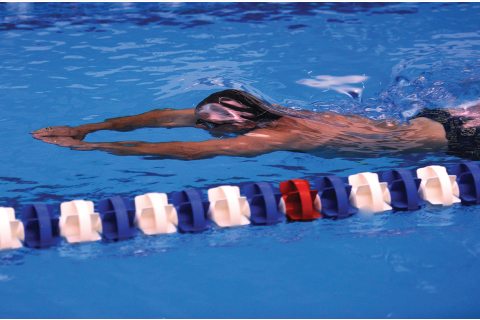Slower-Than-Usual Swimming

When workouts tell you something’s wrong
I pushed the button on my answering machine (yes, I still have an answering machine). “Hi, it's Pete.” . . . [nervous laugh] . . . “I have some interesting medical news.”
Pete is one of my best friends. When he lived in Austin, his wife once complained that he spent more time with me than he did with her.
I called him right back. I was worried.
It turns out Pete went in for a routine colonoscopy. In preparation, they took his blood pressure. The technician promptly disappeared without a word. When he returned, he told Pete they weren't going to be able to do the colonoscopy. Pete had to go to the hospital immediately.
Pete's blood pressure had been outrageously high. Pete, who didn't like the idea of fasting and doing the enema for nothing, suggested that they go ahead and do the colonoscopy. He told them he'd check on his blood pressure the next day. They told him they would not, and could not; he needed to get to the hospital emergency room NOW!
At the hospital, Pete was informed he needed a pacemaker. He told the doctor that he'd like to go home, think about it, and then decide. The doctor let him know there was a good chance he might not make it home without one. So, that was the phone message on my answering machine: Pete had called to tell me he had a pacemaker.
“How high was your blood pressure?” I asked him. He told me.
“What kind of symptoms were you having?” “None,” he said. “None?” I asked, half in disbelief. “Your blood pressure was that high and you weren't having any symptoms?” “Well,” Pete replied, “looking back, I was swimming really slow, about five seconds slower per hundred than usual. I'd been frustrated with that, but I didn't know why I was swimming so slow.” That, I understood.
If you swim regularly, especially if you use the clock, and you find you are swimming more slowly than usual without any clear explanation, it's easy to get frustrated—even though at some level, you know something isn't right. At least I do when I go through those slumps.
A few weeks ago I did a couple of practices with a swimmer who was visiting from Dallas. I knew he had been getting treatment for colorectal cancer. So I asked him how he was doing.
He told me the radiation treatment on his rectum had been extremely painful, but things were going well. They seemed to have gotten it all. Now, he was just going in for regular checks about every three months.
I asked him what symptoms he had. He said he didn't have any. They found the cancer when he went in for a routine colonoscopy.
I told him how, for me, the first indication of anything being wrong (health-wise) always seemed to be swimming much slower than usual over an extended time period. Somehow, it felt qualitatively different and lasted longer than if I were tired, over-trained, or the like. Slower-than-usual swimming was the only symptom I had when I was anemic and when I had a vitamin D deficiency. (Both times, my blood work put me in the low normal range but, for me, these numbers were truly abnormal and problematic.)
“You know,” he said, “come to think of it, I was swimming much slower than usual prior to the colonoscopy. And I had testicular cancer years ago. Then, too, the only symptom I had was that my swimming was really slow.”
So let me suggest that you keep a close eye on the pace clock for more than swimming reasons. If you are swimming unusually slowly or getting inexplicably fatigued when swimming, talk with your physician about it. Though he might not be able to relate to slower-than-usual swimming as a symptom, make sure he takes it seriously as a possible indication of a medical problem. Who knows? Slower-than-usual swimming might be the only indication that something is seriously wrong. Recognizing the seriousness of that symptom might save your life.
As for me, I guess I'm also going to take my physician's advice when he suggests a routine colonoscopy, especially if my swimming is slower than usual.
Oh, by the way: The first thing Pete asked the doctor when he came to after getting his pacemaker was, “When can I go swimming?” No wonder we get along so well.






